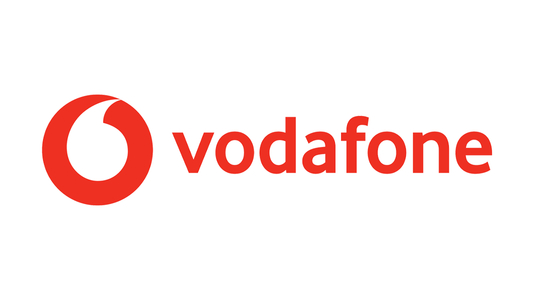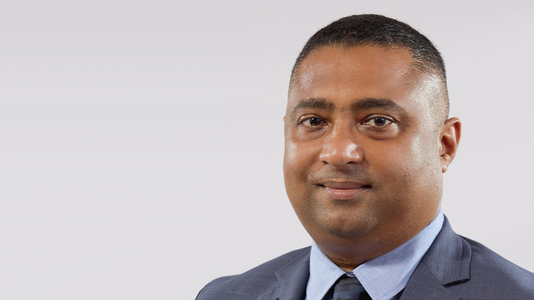

RONALD PRASAD
Chief Commercial Officer
Vodafone Fiji Limited
Ronald is the Chief Commercial Officer for Vodafone Fiji, Fiji’s leading Telco and heads Commercial, Enterprise, ICT & Business Marketing functions. He has over 26 years’ experience in both the Public and Private sectors and has previously worked for the Judiciary, Legal Aid Commission and Exxon Mobil.
He holds various qualifications, including a Bachelor of Arts degree in Information Systems, Management & Public Administration, post graduate qualifications in Finance and Project Management, Master of Business Administration from the University of the South Pacific, Fiji and Executive Education in Strategy & Organization from Stanford University, USA.
Ronald has been instrumental in leading the transformation journey to position Vodafone Fiji as a total communications and ICT solutions provider. He has proven ability and demonstrated experience in Strategy, Leadership, Business Development, Product Development, Marketing and Sales.
CMO Council: What are some of the secrets to better collaboration with peers in the C-suite and lines of business?
Prasad: At C-Level, I believe the most important aspect is to be authentic and genuine. This goes a long way in terms of building trust, which is an essential ingredient for effective and better collaboration. People at this level are usually well versed with their business, however, are generally time constrained. Hence, from the outset, it’s important to define clear goals, objectives and timelines, so everyone is clear on outcomes and deliverables.
It is equally important to discuss and agree on a framework, which has complete buy-in and support from all participants. This is necessary to ensure energy is diverted to the right area. It also aids in avoiding any unnecessary conflicts, especially ones that can have a negative impact on the process. Honesty is also important and so is creating a safe space, so people can share freely, but in the right context.
I have been part of many such cross functional collaboration forums and find, with the above in play, we almost always get the best participation, engagement and outcomes. As facilitators, it is critical to be tolerant, but equally important to have commitment and control to guide the discussions appropriately. If left unguided, it usually becomes a wide-ranging brainstorming session and although useful, it is far placed from context.
CMO Council: Where do you focus most of your time, attention and brainpower on a day-to-day basis?
Prasad: I spend most of my time out with people, meeting and interfacing with key stakeholders, colleagues, staff and customers to drive various business agendas. These include understanding customers’ key business challenges in today’s day and age, talking about new technology and how technology can help transform legacy business practices, influencing shape high level policies, getting views on how the business landscape will evolve over the next few years and discussing key industry insights.
I also spend a fair bit of time on strategy, which in our industry is quite short-lived and subject to continuous change. This is primarily driven towards sustainability of the business in terms of growing revenue and market share. It involves using insights to work on foresight – focusing on big picture, big ticket items such as new product development, developing appropriate marketing campaigns to remain relevant in today’s dynamic market, influencing the right culture to support innovation and identifying and exploring new opportunity areas.
CMO Council: What factors contribute most to your success?
Prasad: Continually striving for excellence and having a 'go-getter' attitude are key contributors to my success. Over the years, I have developed effective problem-solving techniques and my ability to deliver results is driven by my passion to build genuine long-lasting relationships, characterized by a high level of engagement, co-operation and mutual respect.
CMO Council: What is your biggest challenge this year? How are you overcoming it?
Prasad: One of the biggest challenges this year, is the impact COVID-19 is having on businesses and the economy as a whole. In a developing market like Fiji, where Tourism accounts for circa 40% of national GDP, the prolonged border closures are putting immense pressure on the economy. The priorities of businesses have shifted, and this has meant re-strategizing.
When working in developing economies, expect your business to be significantly impacted every 5 years or so, as a result of big change in technology and/or immergence of disruptor technology. Budgets are tight and good vision, creativity, innovation and agility are needed to deliver in a fast paced and constantly evolving marketplace.
Having said that, with challenges, also come opportunities. We had good foresight and evolved our traditional telecommunications business into an ICT business, expanding the product portfolio. We also ventured into mobile money and eCommerce and proactively built additional capacity in this area. During this time, when the traditional revenue streams are challenged, the ICT area, mobile data, mobile money and eCommerce are generating new revenue streams.
Another area is the shift in balance between digital marketing/media versus traditional marketing/media. We are now extensively using digital-based marketing and social media to directly interface with customers. This has helped with cost optimization and reaching more specific and relevant target audience during these difficult times.
CMO Council: What are your priorities when it comes to organizational change, operational lift and staff development?
Prasad: In our industry the only constant is change. Now, more than ever before, we encounter dynamism in all aspects of business, ever-increasing pace and demand for results. I believe in the concept of continuous excellence, which is a journey and involves lifelong learning.
An organization’s DNA is characterized by its People, who naturally are at the center of change, be they staff, customers, shareholders, regulators or other key stakeholders. Investment in people remains a priority, as without effective contribution of people, their buy-in and ownership, it will be difficult to navigate through continuous change.
It is important to keep clear lines of communication, transparency to build trust and empower people, so they have a sense of ownership, and drive intended outcomes.
We have used a couple of guiding principles that have worked well. They include being tolerant of mistakes to allow safe space for creativity and innovation to flourish. Developing a sense of urgency – a belief that work 80% complete on time is always better than 100% complete, past the deadline. As a technology business use of cross functional teams and continuous learning, supported and funded by the company has also worked well in meeting our strategic objectives.
Systems and processes will always be there, and technology will continue to shape the future, however the People aspect is what brings character and defines an organization and its culture. Therefore, key attributes that impact emotion across the differing generations (X, Y, Z) should make the priority list to drive the culture of continuous improvement and relevancy.
